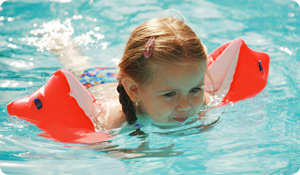
Some parents take their toddlers to swim lessons because the children are naturally drawn to the water. They love to splash and play in the tub, and when the weather is warm outside, they may spend hours in the backyard wading pool.
Other parents may bring their children to swim lessons for the opposite reason: to make their children feel more at home in the water. Generally, babies and toddlers who are exposed to swimming early on are more comfortable with it, but the C.S. Matt Children's Hospital, run by the University of Michigan Health System, recommends temporarily discontinuing swim lessons if a child screams or is afraid of the water.
Getting Started
The Gelsomini family, of Wrentham, Massachusetts, spends their summers on Block Island off the coast of Rhode Island. Given the enormous amount of time the family spends playing on the beach, sometimes inches from the water, Pam Gelsomini signed up for a Baby and Me swim class at the local YMCA when her son, Andrew, turned four.
The lessons started with rudimentary instructions on pool safety. But soon the kids were kicking and crawling in the water. For first-time toddlers taking to the water, most swimming schools require that a parent get in with the child to lend support and comfort. It wasn't necessarily something Pam wanted to do, but it was well worth the effort, she says. After several lessons, Andrew was becoming an independent little guppy, swimming strong and on his own.
Regardless of age, acquiring strong swimming skills happens in a step-by-step progression. And if possible, the lessons should be taught in a small class, preferably, one-on-two (teacher and parent with child).
Learning Environment
Many factors affect a child's ability to learn how to swim, including comfort, confidence, frequency of practice, motivation, and innate abilities. Knowing your child's personality can help create a fun environment.
Also, a warm pool water temperature of 87°F to 94°F, will promote the learning progress, as the child will remain comfortable throughout the lesson. A swim diaperlightweight apparel that's snug to the legwill help minimize the spread of body wastes into the water, which can be a health hazard.
Swim lessons also promote a love of water that can have a positive impact every day, especially for those kids that resist bath time. Andrew loved taking baths after becoming used to the water, said Gelsomini.
Not Drown-Proof
Swim lessons will not make your child drown-proof. According to the U.S. Consumer Product Safety Commission, about 260 children under the age of 5 drown each year in swimming pools, and another estimated 2,725 are treated annually in hospital emergency rooms for pool submersion injuries. You must closely supervise young children in the pool, and make sure they don't play near the water without adult supervision.
It's tempting to think that swim lessons will make your child safer, but the American Academy of Pediatrics warns that lessons for young children may give parents a false sense of security. Even toddlers comfortable in the pool will not know how to react in an emergency or when startled.
Swim Skills by Age
Even so, swim lessons provide an important and valuable foundation for lifelong water safety skills. Here's what you can expect your child learn.
6 to 18 months: Many experts believe children are not developmentally ready for swim lessons until four years of age. However, many parents enroll their children in the program as early as six months old so they can become more comfortable in the water. At six months, babies can learn to hold their breath when dipped under water and swim for a few seconds. Initial submersions of young children should be very brief (one to three seconds), experts say.
19 to 24 months: Toddlers should always remain within arm's length of an adult when in the pool, the American Academy of Pediatrics recommends. Remember, even though you see the kids gaining skill and confidence in the water, these classes are not designed to teach water-survival skills, according to the American Red Cross. Think of it as building a solid foundation for future swimming skills.
2 to 4 years: Toddlers who have been exposed to water since they were six months old may be able to learn some basic swimming skills.
4 to 5 years: At this age, most experts say that youngsters are developmentally able to begin true swim lessons. Children who have been exposed to the water early are more likely to be comfortable in the pool and will learn to swim quickly. Some swim instructors say they can be taught to jump off the side of the pool, turn, and swim back. A strong kicker can learn to come up for a breath while under water.





